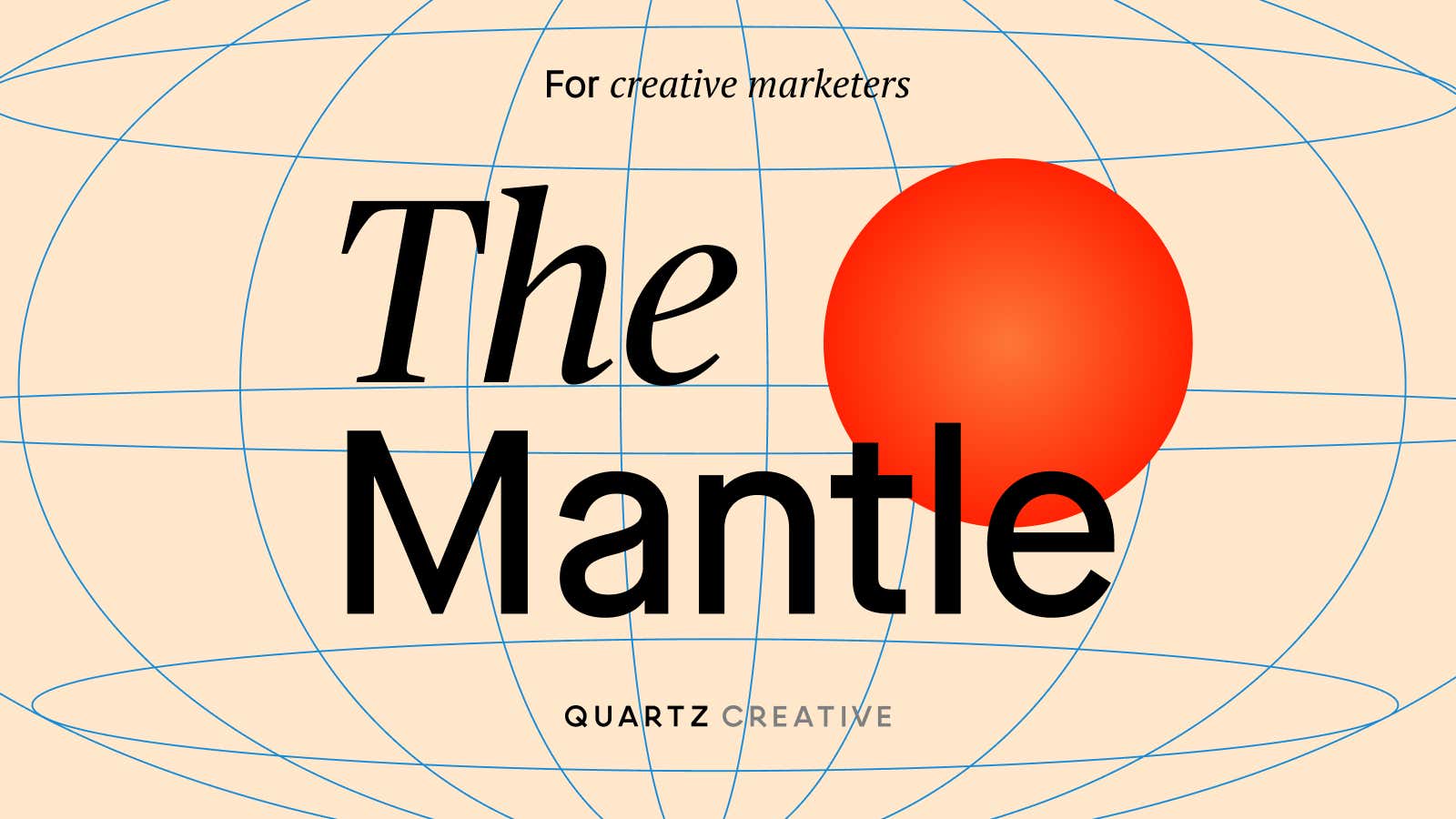Welcome back to The Mantle, your ongoing download on all the marketing trends and industry insights brewing below the surface, courtesy of Quartz’s marketing and advertising teams.
At Quartz, we like to help our readers see around corners and uncover emerging trends to fuel their curiosity. In our recent Global Audience Survey, nearly half of our readers self-proclaimed to be most obsessed about technology innovation and its intersection with human behavior, making this the perfect cocktail to immerse ourselves in the metaverse this month.
Come down the metaverse rabbit hole with us and discover what it is, why it matters, and where it may go in your industry and the global economy at large.
— Natalie Diamond, CRO, Quartz

What is the metaverse?
We sat down with fellow Quartzian and emerging industries reporter, Scott Nover, who covers the metaverse and learned a few things:
What is the metaverse and why should we care?
Coined by Neal Stephenson in the 1992 novel, Snow Crash, the metaverse is a next-generation immersive internet experienced through augmented and virtual reality (AR and VR). You can think of it as a three-dimensional internet you can walk around in. For a deep-dive, check out our recent coverage, including What is the metaverse? and all the terms you need to understand it.
Is it here to stay?
The metaverse matters, because major tech CEOs have dedicated time and resources to building it, and that says something. For its success, it doesn’t just rely on the interface and hardware, but the underlying technology—like computing chips—to keep it going. And chip companies like Intel are now getting into the game.
Where do you see the metaverse in the next six months? What do you expect to change by the end of 2022?
Immediately what we’ll start to see is greater investment in VR and crypto; some agree it is a similar and related field. A lot of companies are getting involved in the crypto space through NFTs, so expect more conversations around VR, AR, cloud technology, computing power, and broadband.
Then, we will see virtual ownership become more normal. In immersive games like Roblox or Minecraft, players build social realities through avatars. With this, there will be a rise of virtual goods to decorate these virtual worlds. We will continue to see companies monetize through in-game purchases—from virtual Nike shoes to virtual outfits called “skins” in Fortnite.
How active a role will it play in our lives?
Right now it’s pretty prohibitive. You either have to be playing a game that has similar properties or own a (very expensive) VR device, like the Oculus. For the average person, you could ignore this for years. The hope is that technology will improve, and you’ll be able to step inside these virtual worlds sooner.
How did Facebook’s announcement to rename to Meta make an impact? And will it last?
It was a huge moment for the metaverse. It was a huge moment for Facebook and the best PR move. I don’t think they would have done it if they weren’t serious about building the metaverse.
Anyone who cares about it should question why and how Facebook wants to build it. How is it going to mirror some of the problems Facebook has now?
It’s a way to develop new technologies and get some runway from investors , but a lot of what they presented is speculative technology they’d like to build and are 5-10 years out from what they presented.
What are the dangers of the metaverse?
What are the dangers of Facebook as a social platform? Take that and multiply it by 100. Facebook has struggled with moderating content on their platforms. Let’s say Adidas is hosting a party in Facebook’s metaverse. How will they moderate it?
There’s also an issue of data and brand privacy and safety. When you make the internet so much more immersive and add that third dimension, it exponentially increases the amount of problems. And our regular frameworks in the US and in Europe are not really equipped.
By the digits
10,000 jobs created by Facebook for the metaverse
1.3 million times the Oculus was downloaded globally between Dec 21-27, 2021, a 363% increase in new downloads week over week
1.51% is the amount Facebook’s stock climbed on the day of announcing its name change to Meta
34 million is the predicted total VR headset unit sales worldwide by 2024
$454 billion is the market cap for Ether (ETH), a top metaverse coin to invest in in 2022

What to be on the lookout for
Impacts to the global economy
From e-commerce to social media, the metaverse could have a significant impact on industries and the way companies work within it. The internet has allowed us to remove distance between people and their communication, but it doesn’t always feel like that. The metaverse will feel like we are doing business, doing work, socializing, or learning with people in one space. It could enable better communication and collaboration with colleagues and people around the world.
Impacts to existing industries
Where social media was a catalyst for several industries, the metaverse has the potential to reach new audiences and cater to consumers accustomed to digital realms. Through virtual worlds, NFTs, and immersive experiences, brands can test new ways to reach different generations of consumers. Look for new hire training platforms at companies, a new market for real estate, immersive educational tools (field trip to Petra, anyone?), and virtual social networks.
Widening the digital gap
The metaverse has the potential to exasperate every element of the digital divide with people with money and broadband access and those without. $300 headsets are prohibitive, and if the metaverse continues to grow in popularity, it would exclude an enormous number of people from the global economy.
Censorship concerns
The metaverse creates big questions about censorship and how authoritarian governments will deal with it. When created in Snow Crash, the metaverse was owned by one company (centralized experience). There’s a real risk that a big company (like Facebook or Amazon) builds it, and it’s so popular it becomes the de facto internet for people. Who controls what? Is it centralized or decentralized? Maybe that’s too meta.
“Brands will need to rethink their narratives in three dimensions, and marketers will need to embrace emerging technology at a faster speed. In the metaverse, everyone is a world-builder, including brands.”
—Cathy Hackl, tech futurist and metaverse strategist

How is the metaverse revolutionizing the advertising world?
The metaverse is moving beyond traditional advertising and is seen as a new frontier for brand experiences. One that is more engaging and potentially less invasive than what we experience with digital advertising today.
See how these brands are taking a new direction:
👛 Gucci digitally outfits Gen-Z in metaverse foray with Roblox
🥤 Coca-Cola auctions its first NFTs
👟 Nike gets bullish on the metaverse and acquires a digital fashion house
🏨 Marriott hopes its NFTs will be the key to having a metaverse presence
Handpicked Quartz
Check out some required reading for ad execs and marketing pioneers:
- Everything you need to know to understand the metaverse by Quartz
- The ten most influential people in the metaverse by Readwrite
- The genius behind the best metaverse twitter thread by Wired
- Snow Crash: A warrior prince plunges headlong into the metaverse in this novel by Neal Stephenson
- The metaverse primer: Nine free essays by media analyst and co-founder of the metaverse Investment Fund Metaverse ATF (NYSE: META), Matthew Ball
See you soon
Thanks for tuning into this months’ edition of The Mantle. If you have any AR field trips, virtual outfits, or extra headsets, send them on over to marketing@qz.com. See you soon!
